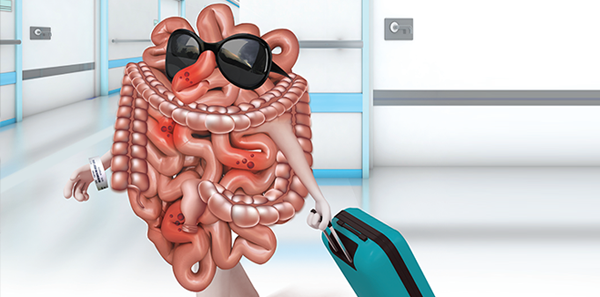
The second, the DIABOLO randomized trial, was performed in a multicenter Dutch population, and the results were presented in 2014.5 Similar to AVOD, this trial hospitalized most uncomplicated cases of diverticulitis and randomized them to either intravenous fluids or intravenous antibiotics. This trial enrolled 528 patients, and again, outcomes were not different between cohorts. Patients in the no-antibiotics arm were treated more frequently as outpatients, had fewer in-hospital days, and ultimately had a crossover rate to antibiotics of 5 percent. Most important, similar to AVOD, no patients in the no-antibiotics arm suffered serious complications, either short-term due to progression of disease or in their six-month long-term follow-up window.
Explore This Issue
ACEP Now: Vol 35 – No 02 – February 2016The final bit of evidence comes from the same group conducting the AVOD clinical trial.6 Based on their findings, these authors initiated practice change at two of the hospitals involved in the prior research and began treating qualifying diverticulitis patients without antibiotics as outpatients. To qualify, patients needed to have clinical symptoms and a CT-confirmed diagnosis of uncomplicated diverticulitis. Patients were then excluded based on being immunocompromised, pregnant, experiencing severe pain or vomiting, or at risk of poor compliance. These authors tracked 155 patients treated in accordance with this strategy, and there were a mere four treatment failures requiring hospitalization and antibiotic therapy. This failure rate, 2.6 percent, was no different than the expected rate of failure with antibiotics of approximately 2 percent. Of the failures, one had progression of a small abscess missed by the radiologist at initial presentation. Contrariwise, there were two patients whose initial CTs showed a missed perforation. Neither of these patients developed complications secondary to observation without antibiotics.
The American Gastroenterological Association published new guidance in December 2015, indicating a “selective” antibiotic strategy for acute, uncomplicated diverticulitis is reasonable.
These data, taken cumulatively, are quite fascinating. However, these data are also quite weak—the GRADE classification of the quality of this evidence is “low.” The AVOD trial suffers from substantial risk of bias, while the DIABOLO trial has been presented only in oral abstract form. The observational evidence is important but also suffers from bias and lack of a control cohort. All this said, however, these data have not gone unnoticed, and many guidelines have changed.
The American Gastroenterological Association (AGA) published new guidance in December 2015, indicating a “selective” antibiotic strategy for acute, uncomplicated diverticulitis is reasonable.7 While this might seem premature to many, given the strength of the evidence, the AGA is actually rather late to the party: the Danish Surgical Society, a Dutch guidelines working group, an Italian consensus conference, and a German society of gastroenterology have all gone on record endorsing similar limitations in the use of antibiotics.7–11 More evidence is certainly needed to strengthen these recommendations, and our lessons regarding medical practice reversal must yet be heeded with any practice change. However, given the benefits associated with avoidance of unnecessary antibiotic use, the growing evidence makes a selective antibiotic strategy appealing.
The limitations of the evidence should be discussed with patients, and appropriate follow-up should be available or arranged. An initial liquid diet seems to be the most appropriate starting point, with progression as tolerated. Patients should expect to have continued, slow resolution of their symptoms over, in general, a week’s duration.
With these guidelines in place, appropriate patients with uncomplicated diverticulitis may be considered for an observation-only strategy. The limitations of the evidence should be discussed with patients, and appropriate follow-up should be available or arranged. An initial liquid diet seems to be the most appropriate starting point, with progression as tolerated. Patients should expect to have continued, slow resolution of their symptoms over, in general, a week’s duration. Treatment failures appear to be infrequent but will occur, and patients should be in a position to seek medical care should their clinical status worsen.
Pages: 1 2 3 | Single Page





No Responses to “Antibiotics, Hospital Admission May Not Help Uncomplicated Diverticulitis”